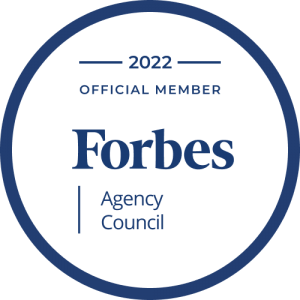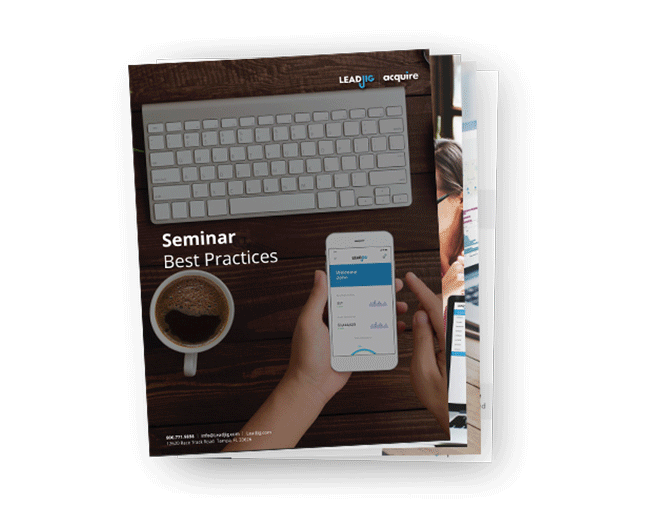Financial Seminar Optimization Tips
Financial seminars are a fantastic way to recruit new high-value clients to add to your portfolio. However, filling your pipeline with quality new clients can be difficult if you are not optimizing your financial seminars and financial workshops. LeadJig wants to assist our clients in hosting the most impactful and successful financial advisor seminars possible. We have developed 10 simple tips to optimize your financial seminars and financial workshops. These 10 tips are separated into the steps you should take before, during, and after your event.
Before Your Financial Seminar
1. Contact Your Financial Advisor Marketing Consultant
Your Marketing Consultant will be your guide throughout this whole process. They will help you start curating your prospect pool and invitation for your financial seminar or financial workshop. If you are affiliated with a broker-dealer or have a compliance approval process, work with your marketing consultant to ensure approval of your campaign. If your broker dealer’s compliance department takes time for approvals/revisions, plan on adding a few days of cushion to your timeline to ensure the campaign is on time.
2. Pick the Perfect Venue
First, decide whether or not a meal event is right for you. Second, choose a time that best suits your prospects. Earlier times work better for prospects 64 and up, and later times work better for prospects 55 to 64. Then, select which days of the week will work best for you. If possible, use two different dates and times for your events. If you have multiple event days, spread them between two weeks. Tuesdays and Thursdays tend to be the most successful days for events. You should also consider local events such as sporting events, Churches, or other gatherings for traffic and venue availability. If you are hosting a financial seminar meal event, evaluate your prospect pool and select a category of restaurant that best suits them. The majority of prospects will appreciate a dinner event at a well-known steakhouse in the area. Think about it as, “If these prospects were to go to dinner tonight where would they go?”. This is a good approach to assessing venue suitability. If you decide to host an educational financial workshop, first look at the material you are presenting. Social Security, Medicare, Retirement, and Estate Planning non-meal events will be best in libraries, community centers, and museums. Once the venue is secure, see what technology they have available. To learn more about finding the perfect venue click here!
3. The Week Before Your Financial Seminar
It is important to research your respondents before your financial seminar or financial workshop event. This allows you to identify the highest-value prospects and build rapport, assuring they get the most attention at your event. However, prospects are not the only people you should be giving attention to before your event. It is also crucial to keep in consistent contact with your event coordinator. Always be in the know, so that if any last-minute hiccups appear you can handle them with ease. After you feel confident in your event it’s time to practice your presentation!!
4. Prep for Your Presentation
Practice your presentation consistently leading up to your financial seminar. A great way to identify areas for improvement is by recording yourself and watching it back. Add your personality to the presentation when you feel confident in the content. This makes you more personable to your prospects. Prospects need to trust you, so talking about your family is a great way to gain more trust. Avoid boring attendees, keep it entertaining. One way to accomplish this is by changing the inflection in your voice throughout the presentation. Another great way to keep attention is by telling jokes. However, if you know jokes are not your strong suit, leave them out.
5. 45 Minutes Before Your Financial Seminar
Before guests arrive, set up a sign-in table, ensure every seat has all the necessary materials and appointment cards, and test your AV equipment! It’s also a good idea to introduce yourself to the staff and review the night’s expectations. Make sure the waitstaff understands when you’d like them to come into the presentation room to serve guests while avoiding disruption.
During Your Event
6. Before Guests Arrive at Your Financial Seminar
This may seem like common sense, but testing your equipment up to your event will help prevent any technical difficulties. Don’t allow a projector, microphone, or laptop to distract from your presentation. It’s also important to bring backups for your supplies. Some supplies are not fixable on the spot, like a bad battery, so bring some alternatives or backups.
7. When Guests Arrive at Your Financial Seminar
Have a team member other than yourself check guests in. Once they sign in, mingle with guests. It can also help to play music to decrease any awkwardness before your presentation begins. Additionally, you should hand out collateral to attendees as they walk in or have it waiting for them at their seats. This way people can fill the awkward few minutes between arriving and your presentation by reading your handout.
8. During Your Financial Seminar Presentation
Have someone else introduce you and give a short speech about yourself and your accomplishments. Remember to stay calm and confident throughout your presentation! You should also be mindful to change the inflection in your voice. Finally, if you are feeling confident, throw in some jokes!
9. Before the End of Your Financial Seminar
If using appointment request forms, be sure to collect them from all interested attendees. Try your best to set as many appointments as possible that night. Then, mingle with guests again once your financial seminar or financial workshop is over.
After Your Event
10. 24-48 Hours After Your Financial Seminar
Call all attendees and thank them for coming to your event. If they made an appointment with you, this is a great time to confirm the date and time scheduled. If they did not make an appointment, then try to set one. You should also call no-shows and cancellations. Offer them an information package and/or a meeting. Finally, send out thank you letters, debrief your staff, and prepare for your appointments!






